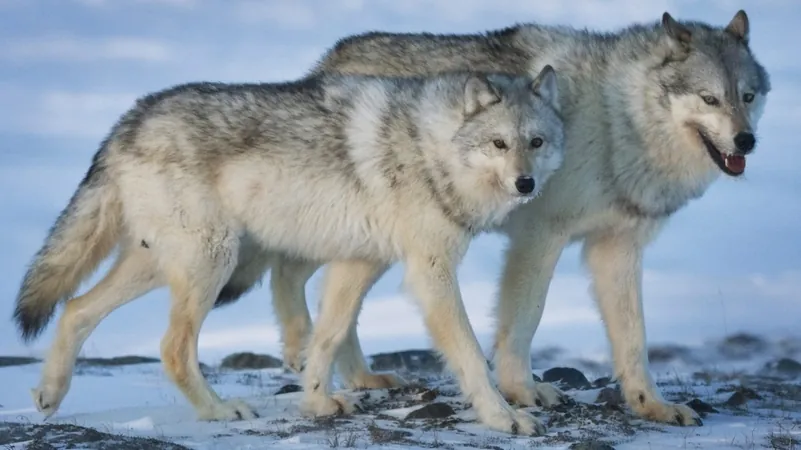
Conservationists Rally for New Protections for Endangered Eastern Wolves in Quebec and Ontario
2024-12-13
Author: Noah
A Heartwarming Encounter with Eastern Wolves
In a heartwarming reflection on the beauty of nature, Gisèle Benoit recalls a magical encounter with a family of eastern wolves in 1984. As a young documentary filmmaker exploring the serene landscapes of Mauricie National Park, she was captivated when a haunting howl pierced the night, leading her to witness an adult wolf emerging with its young pups against a stunning moonlit backdrop. “I will never forget that; it’s anchored in my heart forever,” Benoit states, emphasizing the profound connection she developed with these elusive creatures.
Federal Protections and Threatened Status
Today, Benoit and fellow conservationists are filled with hope as the Canadian federal government takes significant steps to protect the eastern wolf, a species that number fewer than 1,000 mature individuals across its limited habitat in central Ontario and southern Quebec. Recently, the eastern wolves have been reclassified from a "species of special concern" to "threatened," based on alarming data from a 2015 report by the Committee on the Status of Endangered Wildlife in Canada, which suggests a grim population count of as low as 236 mature adults.
Ecological Importance and Recovery Strategy
The eastern wolf, often referred to as the Algonquin wolf, is a medium-sized canid characterized by its distinctive reddish-tawny fur and lives in close-knit family groups. Recognizing their ecological role, the federal Environment Department has initiated a collaborative recovery strategy involving provincial governments, First Nations groups, and Indigenous organizations. This newly mandated plan aims to safeguard the thriving habitats these wolves depend on, particularly within protected areas like Algonquin Park in Ontario.
Challenges in Quebec
However, challenges loom as conservationists seek to secure the wolves’ future, particularly in Quebec, where the provincial government does not officially recognize the eastern wolf as a distinct species. Quebec's Environment Department has classified the eastern wolf merely as a “genetic group,” despite recent genetic studies affirming its unique status. This misclassification does not impede legal protections yet adds complexity to conservation efforts.
Recent Initiatives in Quebec
In October, Quebec launched an ambitious program aimed at enhancing knowledge about the distribution of large canids, including the eastern wolf. Yet, due to low sample numbers and a concerning degree of hybridization among large canids, the province stated that it could not confirm an established population of eastern wolves.
Public Perception and Support
Yet, hope persists. According to Véronique Armstrong, co-founder of the Quebec wildlife protection group, “we seem to be heading in the direction of more protection,” noting recent supportive signs from regional municipalities for a proposed conservation area aimed at safeguarding the wolves.
Changing Attitudes Towards Wolves
Historically stigmatized and feared, wolves are seeing a positive shift in public perception, thanks in large part to dedicated researchers and activists like John Theberge. A retired ecology professor who has studied eastern wolves for decades, Theberge highlights that while challenges remain—such as aggressive hunting policies aimed at controlling wolf populations to protect endangered caribou—the momentum for conservation has notably shifted. “Public support for protecting wolves has significantly grown,” he reflects, pointing out that the landscape of wolf conservation today is drastically more optimistic.
Scientific Consensus on Classification
Scientific debate has long surrounded the eastern wolf’s classification, with conflicting views on whether they are a subspecies or hybrids of grey wolves and coyotes. However, recent genetic analyses have cleared up ambiguities, affirming their identity as a distinct species. Conservationists argue that safeguarding the eastern wolf is vital not only for this species but also for maintaining healthy ecosystems. Wolves play a crucial role as "umbrella species," meaning their protection also benefits numerous other wildlife populations by promoting the natural balance of their habitats.
Moral and Ecological Imperative
As efforts continue, figures like Benoit, Theberge, and Armstrong emphasize the moral and ecological imperatives of preserving these incredible animals. Through their social structures and family dynamics, wolves exhibit behaviors strikingly reminiscent of human communities, fostering a shared understanding of the importance of nurturing our natural world. With increased awareness and concerted action, there is hope that the future of the eastern wolf—and the ecosystems they support—can be secured.









 Brasil (PT)
Brasil (PT)
 Canada (EN)
Canada (EN)
 Chile (ES)
Chile (ES)
 España (ES)
España (ES)
 France (FR)
France (FR)
 Hong Kong (EN)
Hong Kong (EN)
 Italia (IT)
Italia (IT)
 日本 (JA)
日本 (JA)
 Magyarország (HU)
Magyarország (HU)
 Norge (NO)
Norge (NO)
 Polska (PL)
Polska (PL)
 Schweiz (DE)
Schweiz (DE)
 Singapore (EN)
Singapore (EN)
 Sverige (SV)
Sverige (SV)
 Suomi (FI)
Suomi (FI)
 Türkiye (TR)
Türkiye (TR)